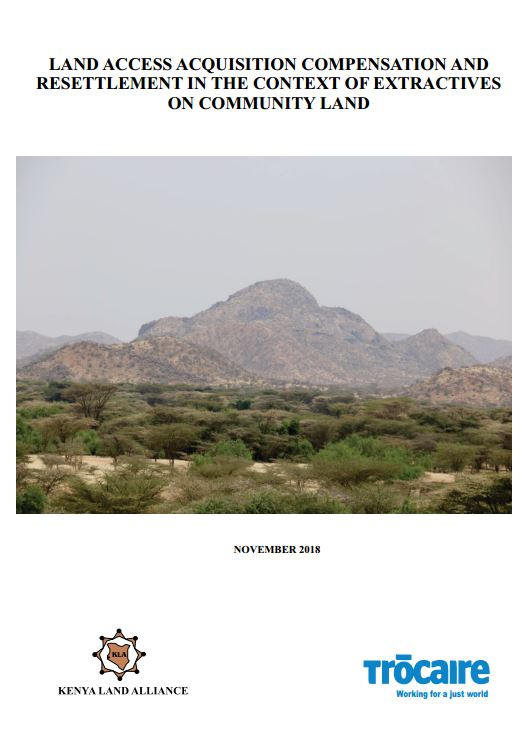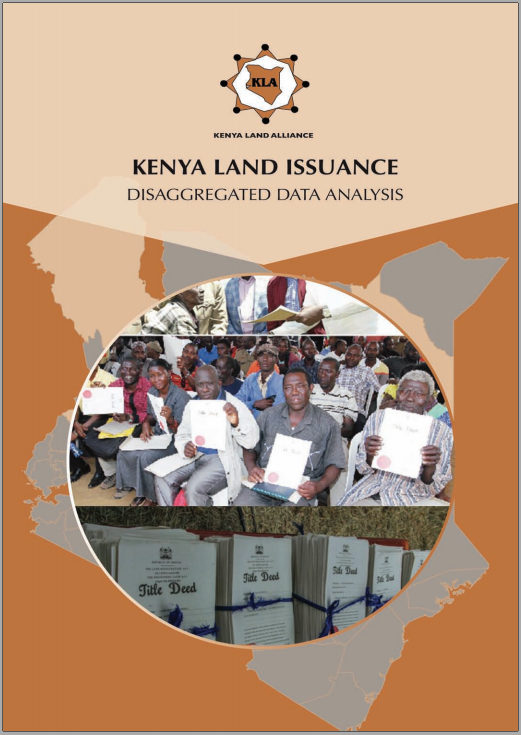The Kenya Land Alliance (KLA) is a not-for-profit and non-partisan umbrella network of Civil Society Organisations and Individuals committed to effective advocacy for the reform of policies and laws governing land in Kenya. KLA was founded in 1999 and registered as a Trust in 2001. The initiative to create an institutional framework for land laws and policy advocacy in Kenya was necessitated by the realization that the policy, legal and institutional framework created in 1950’s had become inadequate due to many changes in the social, political, economic and cultural fronts that had occurred in the country over the years.
The increased population has resulted in intense competition for access to land and natural resources. In addition, changes in the global environment brought about by globalization have combined to create a reality that is significantly different from the one existing when the
current framework was created in the 1950s. It is on this premise that KLA has been in the forefront in efforts towards effective advocacy for land laws and policy reforms in Kenya, as recently witnessed in the Presidential Commission of Inquiry into the Land Law System of
Kenya and the Constitution of Kenya Review Commission. Advocating for the formulation and implementation of a National Land Policy and review of land laws.
Our Vision
A society in which all people are assured of sustainable livelihoods through secure and equitable access and utilisation of land and natural resources.
Our Mission
To facilitate the activities of members by gathering and disseminating information towards an all-embracing, participatory and comprehensive land policy and law reforms in Kenya.
Members:
Resources
Displaying 6 - 10 of 76ENVIRONMENT CONSERVATION ,CLIMATE CHANGE,ENERGY AND THE CHALLENGE OF CHARCOAL PRODUCTION - NAROK COUNTY
Kenya Land Alliance (KLA) in partnership with Indigenous Livelihoods Enhancement Partners (ILEPA) and through the support of the Global Green Grants is implementing a project on Climate change, Livelihoods, and energy targeted at Women and Youth in Narok County.
WOMEN’S LAND RIGHTS IN SETTLEMENT SCHEMES IN KENYA
Women’s rights to land remain a contested issue in Kenya despite the acceptance of the principle of equality of the genders in law. The 2010 Constitution of Kenya clearly provides for the principles of equality and non-discrimination at Article 27. Moreover, in the land policy principles and the national values and principles of governance, gender equality is included. Despite these clear provisions however, gender inequality in land relations persists. The patriarchal social ordering that privileges men in land holding has been a greater barrier to women’s land rights.
LAND ACCESS ACQUISITION COMPENSATION AND RESETTLEMENT IN THE CONTEXT OF EXTRACTIVES ON COMMUNITY LAND
About 3.5 billion people live in countries rich in oil, gas or minerals. With good governance and transparent management, the revenues from extractive sector can have positive impacts leading to poverty reduction hence boosting shared prosperity , while respecting both the needs of the community and the environment. The extractive sector in Kenya contributes about one (1) per cent to Gross Domestic Product (GDP) and three (3) per cent of the total export earnings.
INTERNATIONAL DAY OF RURAL WOMEN 15TH OCTOBER 2018 PROGRESS IN ADDRESSING WOMEN LAND RIGHTS - RETRACING THE JOURNEY
THEME: “Sustainable infrastructure, services and social protection for gender
equality and the empowerment of rural women and girls”
Kenya Land Issuance Disaggregated Data Analysis
This booklet reveals that women only got 103,043 titles representing 10.3 percent, while men got 865,095 titles representing 86.5 percent of the total. The glaring disparity is made clear when looked at against the actual land sizes and titled for women against men. The data sample shows that out of 10,129,704 hectares of land titled between 2013 and 2017 women got 163,253 hectares representing a paltry 1.62 while men got 9,903,304 hectares representing 97.76 percent.






